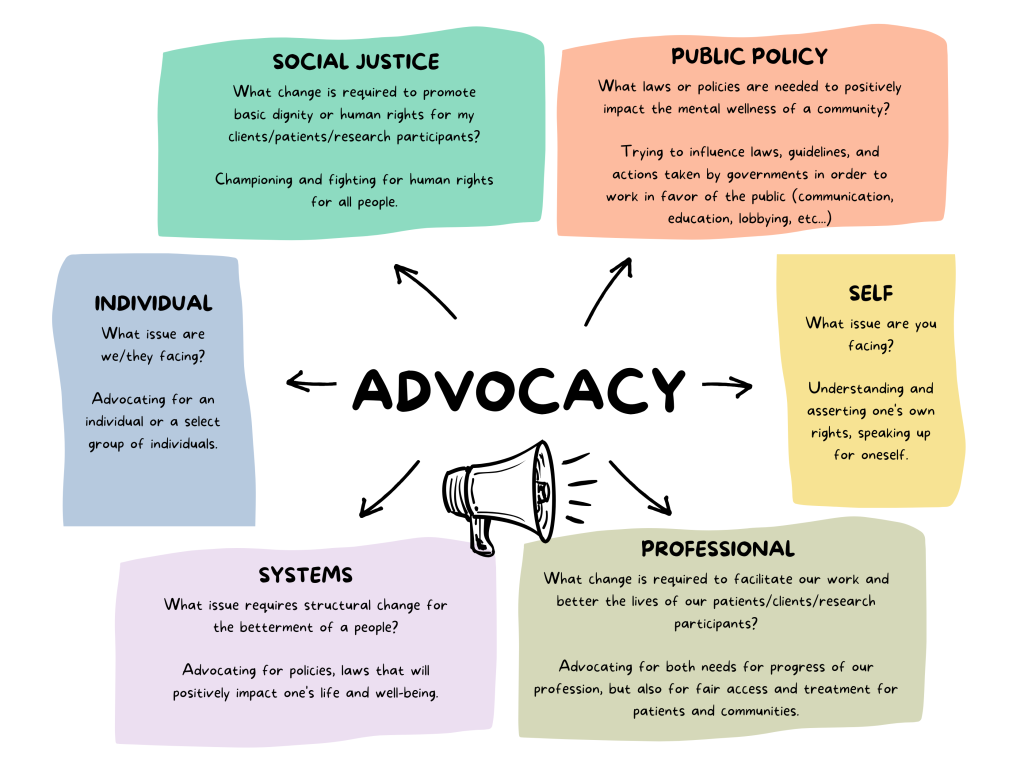Advocacy & Resources
Advocacy plays an important role for psychologists and is even one of the American Psychological Association (APA)’s competency benchmarks for professional psychologists.
The APA outlined several advocacy priorities in 2024, many of which are rooted in Diversity, Equity, Inclusion, and Belongingness, and overlap with the much of the research done in the C-CAP Lab.
It takes a certain amount of concerted effort to become involved in advocacy, and there are many ways to get involved in advocacy in small and big ways. The options can be a bit overwhelming and might leave you wondering, “How can I get started?”
First, it is important to acknowledge that there are many different layers of advocacy. These examples are taken from a wonderful APA Division 37 (Society for Child and Family Policy and Practice) presentation, Promoting behavioral health equity through advocacy: Skills, strategies, and lessons learned led by Dr. Marilyn Sampilo, a pediatric psychologist who specializes in integrated behavioral health and health equity for marginalized communities.
Advocacy Spotlight: Sexual and Gender Diverse Youth Mental Health
Sexual and gender diverse youth have worse mental health compared to cisgender, heterosexual youth including higher rates of depression, anxiety, and suicidal thoughts and behaviors than cisgender heterosexual high school students. *Information based off of data collected by the Trevor Project in 2023 (https://www.thetrevorproject.org/survey-2023/)
Sexual and gender diverse youth face barriers accessing mental health treatment:
56% of sexual and gender diverse young people wanted mental health care in the past year but were unable to get it.
These mental health difficulties are because of minority stress, or daily instances of discrimination that can occur at school, home or other places.
Laws and policies that ban discussions about sexual or gender diverse topics, and anti-transgender laws also worsen mental health for sexual and gender diverse youth. Anti-Transgender laws cause up to 72% Increase in Suicide Attempts Among Transgender and Nonbinary Youth. Read more about it here.
Ways you can advocate at every level:
Self-advocacy
- Educate yourself and share these resources with those around you about your rights and the rights of youth you know:
- Click here for information for parents, here for information for teachers, and here for information for individuals in Maine. If you are raising or interacting with children, educate them too. You can use this list of books.
- Consume media made by LGBTQ+ individuals and parents of LGBTQ+ youth, and encourage those around you to as well.
Individual
- Create a safe space: Ask about a youth’s name and pronouns (don’t assume), use gender inclusive language, and if you misgender someone or make an assumption about someone’s sexual orientation by accident: quickly correct yourself, apologize, and move on.
- Check in with LGBTQ+ youth around you: Take a minute and tell the LGBTQ+ person in their life that you care about them and accept them. From research, we know that small acts of kindness from close individuals can make a big difference
Social justice
- Create an affirming space no matter if you know anyone who identifies as sexual or gender diverse: Wear/display LGBTQ+ affirming symbols, address harmful comments made by others (don’t rely on the youth to do that), and include sexual and gender diverse youth in inclusivity changes/efforts. For more information click here.
- Pay attention to intersectionality: LGBTQ+ youth who hold another minoritized identity (e.g., BIPOC identity) have unique experiences that differ from individuals who (for example) are white and LGBTQ+. These voices are important and often left out of the conversation.
- Here is an article and a video about intersectionality, and some links to media made by individuals who have intersectional LGBTQ+ identities: Queer News Podcast, Bad Queers, and a list of books.
Professional
- Learn how your role as a healthcare worker, and therapist can be more affirming, and ways to ensure that your clinical research is LGBTQ+ affirming.
Systems
- Learn about harmful policies and practices, such as conversion therapy, laws preventing gender-affirming care, and laws banning LGBTQ+ topics.
- Learn more about the legal protections in Maine, and ways to advocate in this state.
- Advocate for LGBTQ+ rights in your workplace, at your children’s school, etc. (e.g., gender-inclusive policies, such as gender-neutral bathrooms.)
- Research how your local elections are related to LGBTQ+ rights. Want to get more involved? Click here or here.

